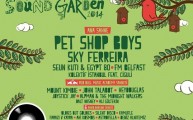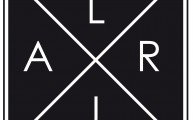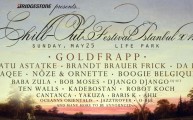Compost talk with Thomas Herb
EDHID DOGMATIC radio show with Thomas Herb (27th November 2014)
Inspired by US Garage House, Munich-based Thomas Herb contributed significantly to the house movement in the Bavarian capital with playing alongside influential artists like Tony Humphries, Carl Craig, Peter Kruder, Boris Dlugosch, Dixon and many more since almost two decades and especially his longstanding residency at Flokati House Club that took place in Munich’s legendary dance institutions like Ultraschall or Harry Klein provided him a play- and learning ground for his musical endeavours. He co-hosts Compost Black Sessions at Munich’s leading house clubs and curated the eponymous radio show for several years. Apart from the musical part of Compost, he is also business manager at the versatile German label.
Supplementary to Thomas Herb’s extraordinary debut at EDHID’s DOGMATIC radio show on Dinamo, we took the chance to have a factful conversation with him about early inspirations, DJ business and why it’s important that independent electronic music artists should receive a fair share for their music played. Enjoy!
Hi Thomas! If you have to burn down your entire record collection except three pieces, which would you pick and what memories do you associate with them?
Hello! Wow, that’s a pretty hard question to start with but today I think I would go for the following three:
4D ‘Sex Appeal’ (Wunderwerke)
A superb German 10” from the ‘80s. A good friend and me were hunting for this record for quite some time in the pre-Internet era and we’re even happier when we finally had our copies in the mail back then. I was introduced to this song when it (still or again) has been played in my favourite club in the early ‘90s – loved it and still love it for it’s elegant, kind of laidback but pretty danceable vibe, unique production, super warm synth sounds and this mix of German and French vocals.
Frankie Knuckles pres. Satoshi Tomie ‘Tears’ (FFRR)
There are so many superb soulful vocal records from the ‘90s out there that influenced and inspired me as a DJ. This one will always be super special for me and I’m still getting goosebumps while listening to it on a proper system. The Def Mix crew is on top of the game here, banging together with one of the most magic Robert Owens moments on a master! I’m more than happy that I had the chance to play alongside the always kind and humble Robert Owens for several shows when he released his Art album on Compost a few years ago.
The Smashing Pumpkins ‘Mellon Collie And The Infinite Sadness’ (Virgin)
For me this is definitely one of the best and most complete rock albums and since I’m only able to keep three records, I absolutely need to keep a rock record as well. Great songs, arrangements, orchestration and production with a rough twist! Stuff like this is lacking essentially these days in pop / rock, i.e. that a rock band coming from the underground is able to bring out a really cool record and having crossover success with their art without selling their souls. The pop / rock scene of nowadays seems to be all about highly polished, adult contemporary, radio-friendly songs written by commercial songwriters just to make it sell / getting played. However, I may have focused too much on electronic music within the last years that is still very exciting to me in terms of movement and musical development.
Can you describe the feeling when you were dancing at Stuttgart’s M1 to ‘Relight my Fire’ and how it motivated you to start DJing?
Well, this is a long, long time ago (laughs) – probably 1996 or 1997 – but I remember it very well. Erick ‘More’ Morillo has been playing that night at M1, one of the leading techno- and house clubs at that time. Morillo played a really good and deep set but then towards the end of the night he threw in Dan Harman’s ‘Relight My Fire’ and it just felt amazing and uplifting. The atmosphere of the entire club climaxed when he played that record. I was already buying house records, playing my very first small gigs back in the day but this might have been a turning point at which I realised that it makes a big difference to experience this music collectively with like-minded people in the club and on a proper system. I also found out how important it is to build up a set properly, i.e. working towards a certain point or record and about the constant communication between the DJ and the crowd on the dance floor.
You played a residency at legendary Flokati House Club events hosted by Tobi Neumann at Munich’s reputable dance institutions like Ultraschall or Harry Klein later. How was the vibe there and did this time influence your style of DJing?
Yes, that’s true and I’m still very happy that Tobi Neumann and his partner Marcus Kanzler felt confident about me and my DJing and offered me the chance to play at the Flokati House Club on a regular basis. The Flokati night has been held every Friday night in the small room of Ultraschall II . The room had a quite low ceiling, a super warm sound system and big parts were lined with green flokati carpet. I think I started playing there in 1999. The vibe was special all the time and Tobi and Marcus invited a diverse range of outstanding DJs – most of them even on a regular basis. DJs like Ata, Ricardo Villalobos, DJ Hell, Steve Bug, Mathias Tanzmann, DJ T., Dixon, Clé, Heiko M/S/O played there as well as Tiefschwarz, Boris Dlugosch, Hans Nieswandt, Ian Pooley, Karotte and the list continues almost ad infinitum. I definitely learned a lot during my time there. Resident DJs played a ‘classic’ support slot from 11PM till approximately 2AM and then you took over again when the guest DJ decided to end his set which often enough didn’t happen (laughs). So the challenge was to play a proper warm-up and rolling out a musical carpet for the guest DJ. Towards the end of the night, it was about keeping the tension and vibe and later on bringing it down gently, trying some more obscure music or going really deep in the morning hours. Also the fact that all residents had the chance to play peak times occasionally was very helpful and cool. From today’s view, I can say that the Flokati times also opened my ears and heart for a more minimalist approach to house. I’m not talking about minimal as a genre but rather about a house sound that still had soul and deepness embedded in a more stripped-down production style. Coming from a more classic US-House background, which had been a bit lost in stereotypes at that time, this felt fresh and inspiring to me.
You played alongside some of the most respected House artists from the US and Europe. Did a long-awaited guest appearance ever disappoint you or did a DJ of whom you didn’t expect something special even surprise you?
I never felt really disappointed by a set or performance of any of the biggies with whom I had the pleasure to play alongside. These guys all have a lot of experience and they are all professionals. However, I always love when a DJ, of whom you expect a certain kind of vibe or music, is going to surprise with something special or unexpected. This doesn’t happen very often but if it’s going to happen, it’s often related to the quality of the club/night and the crowd the DJ is playing for. If these parameters are positive, a good DJ might be able to surprise.
In the late ‘90s, you worked at the label/booking agency Caus-N-ff-ct that included renowned US House artists as Tony Humphries, Armand van Helden, DJ Sneak and many more in its roster. What are the challenges of being a good agency and do you think that the dynamics of entire industry was boosted by the significant increase in DJ fees over the last years?
That’s a long time ago and I mainly worked for the label arm of Caus-N-ff-ct where I, in my personal opinion, mostly learned how NOT to do things if you want to have a successful label (laughs). But of course, I had some insights in the booking field as well. Representing the artists above for Germany also meant working closely with their main agencies in the U.S. and Italy that already reached a very professional level at the time. I remember reading Masters At Work’s DJ rider at one of my first days in the office; there were so many details to be fixed by the club/promoters even back in the day. And the DJ fees of these artists were already quite significant back in the days, too (laughs). But what is the challenge of being a good booking agency? In my opinion, firstly it’s about taking care and dealing successfully with a lot of details and being as close and connected with your artists as possible. It’s the same for clubs, festivals and promoters on the other side, i.e. working as gentle and professional as possible for all parties. Secondly, don’t just focus on your big names – also try bringing in some new and second row talents into the game – they might be the future. Thirdly, Trying to work out a well-balanced schedule together with your big name artists, i.e. festivals and well respected bigger sized events as well as smaller more underground clubs with less budget. Last but not least, try to stay humble and never forget where you come from. Regarding your last question; I think it went the other side round, i.e. due to the massive dynamics of big events and the popularity of electronic music in general, the DJ fees for the leading DJs in the circuit massively increased. It’s actually a market so the law of supply and demand applies. On the other hand, the DJ fees for the resident DJs and second row DJs decreased a bit. However, that’s another topic!
Who does the A&R work for Compost Black label and what sound aesthetic does the Compost sub label target?
The main A&R for Compost Black Label is our head honcho and Compost Records founder, Michael Reinboth. He opened this subsidiary in 2005 in order to create an outlet for deep, quality but more 4/4 based club music (reacting on significant changes in the clubbing landscape and club music at the time). Basically, the label is about house music. I would say modern, playful house with a certain musical twist. In the first two or three years, I haven’t really been involved in the A&R’ing for this label but within the last years, due to my reputation as a DJ and being the host of the Black Label club nights we held in Munich, Michael often involved and still involves me in the process of finding and listening to new music, testing it out in the club, discussing potential remixers etc.
You are DJing since 1996. You released productions and remixes together with Show-B, however, just few years ago in 2012. What made you hesitant to venture the shift from the decks to the studio?
First of all, I have to admit that I’m not the kind of tech-geek who played around with samplers and gears since his teenage days, so I haven’t had this kind of playful access to gear and audio software as other people had from their early youth on. My first aim was getting deeper into the music itself, collecting good records and being a good house DJ in the first line. Nevertheless, I had some studio experience earlier. That was with a friend from Vienna around 2000 or 2001. We made a proper track which unfortunately never saw the light of day due to use of heavy samples (laughs). Shortly after that, I had some major personal shifts that really forced me to focus on my new job at Compost and DJing. However the main fact was probably that I didn’t meet my potential production partner in Munich, i.e. someone who shares my musical vision as well as being a very good friend. This changed when I met SHOW-B when he released his debut EP on Compost Black in 2008. So we often met, talked, exchanged our thoughts about music, were DJing together and became friends. Hence, going to the studio with him, who’s a great producer and engineer, was quite a natural progression back then and I’m more than happy that it still feels like this to date!
Compost supports like-minded collectives from Zurich by incorporating them as a sub label like Drumpoet Community or providing Compost’s platform to Kalabrese’s Rumpelmusig. Would you say that Compost is a kind of Kompakt for jazz-influenced house labels that serve deeper realms of dance music? Do Compost Black, Drumpoet Community and Rumpelmusig complement or rather substitute each other?
Even if this is a flattering comparison – we really respect Kompakt for their work, output, shop- and distribution work – I think this can’t be compared. Due to it’s own distribution arm, Kompakt shows a different structure to the one we have. We’re not a distributor but we use our distribution setting with Good To Go / Groove Attack for our partnerships with the Zürich-based Drumpoet Community as well as with Kalabrese’s Rumpelmusig. While Compost is using it’s structures and manpower to taking care about the whole and more dry exploitation process — physical- & digital sales, licensing, manufacturing, royalty management, accounting etc.— for the partner labels, Drumpoet Community and Kalabrese are able to fully concentrate on all creative aspects of their labels. In my opinion and due to the fact that all of the labels mentioned above are A&R’ed by different people (who all have an excellent but individual taste), it’s fact that the labels complement each other.
You are also in charge for the licensing and royalty management at Compost. A leading Japanese equipment producer introduced recently software that recognises the music played and collects all information. Do you think that independent labels receive a fair share for their music that gets played?
I’m familiar with the software you are talking about. The question is if this leads to more income for producers or labels or if it’s just another tool to ‘spy’ out what’s working best for a majority of DJs. This would lead into nothing good and even more killing individuality in my opinion. But if a similar technology – like a deluxe version of Shazam for example – would be transferred into a system which could be easily installed in clubs or at festivals everywhere in the world, this would be a major achievement. So the music/playlists played during the event could be easily reported to institutions like GEMA in Germany and similar authorities all over the world. That would finally lead to a situation where the artists and producers earn their fair share of the fee that each and every club/festival is bound to pay for public performance to such institutions anyway. This would benefit electronic music artists and independent labels in particular, since their music is mainly played at clubs / festivals and less radio.
What can we expect next?
On the label side of things there are some very interesting releases in the pipeline on Compost Black like the upcoming release of DJ Yellow & Flowers And Sea Creatures in early December that includes superb remixes from Tuff City Kids and Konstantin Sibold plus the lovely original. You should definitely watch out for this gem. For next year, we are currently planning some events in connection with Compost’s 20 years anniversary. Expect parties and club nights featuring well chosen line-up’s in Munich, Berlin, Karlsruhe, Zürich and more European cities. DJ wise, I’m happy with my monthly residency at the new Munich club MMA – Mixed Munich Art – located in an old heating plant in the city centre where I have the pleasure to play with Dauwd (Kompakt) on Friday, 28th of November.
Thomas Herb on Soundcloud
Leave a Reply
-

Babylon Soundgarden 2014
-

EDHID SHORTCUT: Baris Akardere alias Beraber (NL)
-

Interview with Michael Mayer (Kompakt Records)
-

Live at Robert Johnson showcase at Suma Beach
-

Chill-out Festival Istanbul 2014
-

Wareika playing Wake Up Call
-

Baris K Solo
-

Each of six d.o.g.s will have its day!
-

Compost talk with Thomas Herb
-

Chloé at Suma Beach



